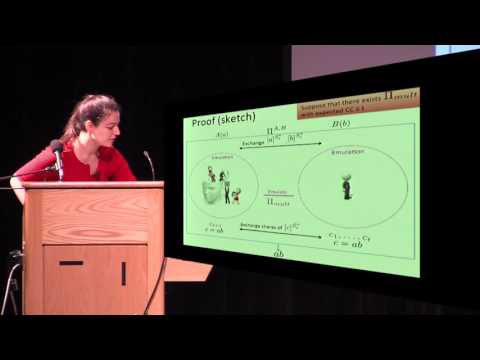Welcome to the resource topic for 2015/1097
Title:
On the Communication required for Unconditionally Secure Multiplication
Authors: Ivan Damgård, Jesper Buus Nielsen, Antigoni Polychroniadou, Michael Raskin
Abstract:Many information-theoretic secure protocols are known for general secure multi-party computation, in the honest majority setting, and in the dishonest majority setting with preprocessing. All known protocols that are efficient in the circuit size of the evaluated function follow the same ‘‘gate-by-gate’’ design pattern: we work through an arithmetic (boolean) circuit on secret-shared inputs, such that after we process a gate, the output of the gate is represented as a random secret sharing among the players. This approach usually allows non-interactive processing of addition gates but requires communication for every multiplication gate. Thus, while information-theoretic secure protocols are very efficient in terms of computational work, they (seem to) require more communication and more rounds than computationally secure protocols. Whether this is inherent is an open and probably very hard problem. However, in this work we show that it is indeed inherent for protocols that follow the ‘‘gate-by-gate’’ design pattern. We present the following results: -In the honest majority setting, as well as for dishonest majority with preprocessing, any gate-by-gate protocol must communicate \Omega(n) bits for every multiplication gate, where n is the number of players. -In the honest majority setting, we show that one cannot obtain a bound that also grows with the field size. Moreover, for a constant number of players, amortizing over several multiplication gates does not allow us to save on the computational work, and - in a restricted setting - we show that this also holds for communication. All our lower bounds are met up to a constant factor by known protocols that follow the typical gate-by-gate paradigm. Our results imply that a fundamentally new approach must be found in order to improve the communication complexity of known protocols, such as BGW, GMW, SPDZ etc.
ePrint: https://eprint.iacr.org/2015/1097
Talk: https://www.youtube.com/watch?v=EkDN6ARIcu8
See all topics related to this paper.
Feel free to post resources that are related to this paper below.
Example resources include: implementations, explanation materials, talks, slides, links to previous discussions on other websites.
For more information, see the rules for Resource Topics .
